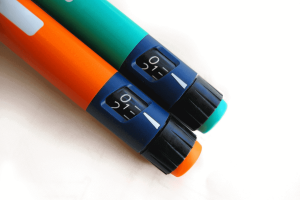So, I’m Diabetic. Now What?
I was stunned. I had always been at least a little bit overweight. Previous attempts to do something about it, if they succeeded at all, were short-lived. Diabetes ran rampant through my mother’s family. Even with that, I never worried about sugar–I only worried about fats, if I watched my diet at all. Many sugar-filled items are fat-free, so I thought they were okay. So between that and the family history, I became a statistic.
My initial HbA1c reading was 9.4, which was obviously unhealthy. I have no way of knowing how long I was diabetic prior to that, but now that I knew, I needed to get some help.
The first course of action was to get me on a regular dose of Metformin. I also enrolled in a diabetes education course at one of the local hospitals, where I could learn how to test my blood sugar and meet with a dietitian to learn about the dietary changes I was going to have to make.
The Metformin was easy — the diabetes education, not so much. In a classroom at the hospital with 8-10 strangers, all of whom were newly diagnosed or in bad enough shape to need a refresher course on how to manage the disease, the first session was very overwhelming. There was a lot of information to take in and so many things to remember. We learned about how to count carbs and how many carbs we should be eating for each meal and snack. I had to really start reading labels and pay attention to my food intake!
There is a great deal of information available online and through various books on the topic of diabetes. I did a lot of research and bought several books to help me understand what was going on with my body. Researching on the internet can be difficult, because we all need to be aware of whether the source of the information is valid, reputable, and up-to-date — and this kind of information isn’t always available. There are great strides being made in the treatment of diabetes and things are changing pretty rapidly. Some doctors are really great at keeping up with the latest research and information and others not so much, so it is critical that you as a patient keep yourself informed. My Diabetes Home strives to help make that easier and will continue to work toward that goal. You and your doctor need to partner to make the best decisions about your care and management of the disease, what treatments are best for you, and how to keep yourself as healthy as possible.
The biggest thing you need to remember is this: You can LIVE with diabetes. It is NOT some kind of death sentence. Yes, you have to make some changes–some of which any person who wants to live a healthy lifestyle should make anyway. If you are on medications, you have to take them on schedule. You have to test your glucose levels regularly before and after eating and other activities, such as exercising and driving. You have to be prepared to handle both highs and lows. And as you’re changing your lifestyle, the patterns you have discovered for yourself will continue to change. It’s okay. Yes, it will be frustrating and tiring at times, but diabetes does not have to limit what you can do in your life.
Be smart.
Be healthy.
Live your life.
photo credit: jessicafm via photopin cc



